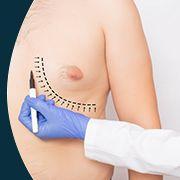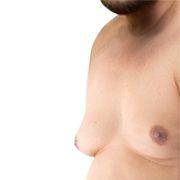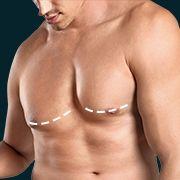Diet Guide: Foods to Eat and Avoid for Reducing Gynecomastia
In This Article
Diet Guide: Foods to Eat and Avoid for Reducing Gynecomastia
Ruban
Updated on February 01, 2024
Medically verified by Dr. Arya
Fact checked by Dr. Pournami

Cosmetic
5 min read
Are you feeling low and embarrassed due to your man boobs?
You’re not alone and it is just a condition like any other, and can be treated.
In case you’re not aware, male breast tissue can become larger than usual in a condition known medically as gynecomastia, or man boobs. Certain illnesses or changes in hormones could be the cause of this.
Also, gynecomastia is benign, and it should be distinguished from malignant breast development.
Have you ever wondered if your diet has any role to play and whether or not it is linked with gynecomastia? In case you want to explore this, you’re in the right place.
In this blog, Mykare Health explains how to successfully lose man boobs with diet and exercise if you have gynecomastia, feel uncomfortable, and are concerned about it.
Can Foods Cause Gynecomastia?
Gynecomastia is usually caused by imbalanced hormone levels in men. Men with gynecomastia, in particular, tend to have greater amounts of estradiol, a kind of estrogen. This can result in more accentuated breasts.
-
While heredity, diminishing testosterone with age, thyroid difficulties, and other health conditions are common causes, nutrition can also play a role.
-
Certain foods may promote excessive weight gain or elevated estradiol levels in men who are predisposed to gynecomastia.
7 Best Foods for People with Gynecomastia
A hormonal imbalance can cause gynecomastia, thus it is critical to consume a well-balanced diet and receive adequate nourishment.
You can incorporate these seven food products into your daily diet, as they have been shown to have beneficial impacts. Consult your doctor to get the best advice.
1. Fish Oil
Fish oil, which is high in antioxidants and Omega-3 fatty acids, can help those with gynecomastia. It also helps to combat damaging free radicals. Cold-water fish oil, such as tuna and salmon, can be taken with two spoons at night. You can also speak with your doctor about taking fish oil pill supplements.
2. Zinc-based foods
Zinc stimulates testosterone production in the body, thus those who exercise regularly should eat zinc-rich foods. Foods high in zinc include cashews, raisins, chickpeas, and lobster. You can also take zinc supplements after seeing your doctor.
3. Vitamin-E rich food
Sunflower seeds, almonds, pumpkin, and red bell pepper are foods high in vitamin E and polyunsaturated fatty acids. These may assist to inhibit the oxidation of free radicals, which causes gynecomastia.
4. Milk Thistle
Breast enlargement might be a sign of liver disease, and milk thistle helps the liver operate properly. After speaking with a doctor, you may consume crushed milk thistle seeds in three glasses of water.
5. Vitamin-D-rich foods
Mushrooms and fortified dairy supplements are high in Vitamin D. Sunlight is another naturally occurring resource. Obese persons are more likely to develop gynecomastia, and consuming these foods may assist.
6. Anti-inflammatory food
Leafy green vegetables and fish oil can help reduce edema of any kind because they contain anti-inflammatory effects. If you have gynecomastia, it is recommended that you consume these foods in plenty to prevent inflammation and swelling.
7. Whole fruits
Fruits are rich in fibre and vitamins and are the perfect detox for your body. This may provide sufficient plant-based nutrition.
 9 min read
9 min readThe Advantages of Choosing Mykare Health for Gynecomastia Surgery
 6 min read
6 min readIdentifying The Ideal Age For Gynecomastia Surgery
 6 min read
6 min readPre and Post Gynecomastia Surgery: Essential Things to Know
Get a Callback Now
Foods to Avoid for Gynecomastia
A healthy, balanced diet is essential regardless of gynecomastia. Certain foods should be restricted or avoided entirely. Here they are:
1. Processed Foods
Processed foods are higher in carbohydrates and sugars. These empty calories are a common cause of excess weight gain. In addition, processed foods are more likely to contain chemicals such as polycarbonate or bisphenol A, which inhibit testosterone and are commonly found in containers such as cans or plastic cases. Focusing on fresh foods will improve your health and reduce the risk of gynecomastia.
2. Soy
Soy products such as tofu, tempeh, edamame, and dairy substitutes can be good sources of plant-based proteins for some, but they are also high in phytoestrogens. These are the plant equivalent of human estrogen, and studies have shown that they may be molecularly similar enough to mimic the effects of estrogen. This means that patients with gynecomastia may be better off avoiding these products to prevent their breast tissue from growing further.
3. Eggs and Dairy
All eggs and dairy contain chicken or cow estrogen, which is identical to the human hormone. This is true even for products that are listed as “hormone free.” These labels indicate that the livestock were not given additional hormones, however, some natural hormones will be present regardless.
FAQ
1. What foods can help reduce gynecomastia?
Nutrient-dense foods ,Protein,Omega-3 fatty acids,Fruits and vegetables, and Fiber-rich foods can help to reduce gynecomastia
2. Can diet alone cure gynecomastia?
No, diet is only one aspect of managing gynecomastia. In some cases, medication or surgery may be necessary.
3. Should I consider taking gynecomastia supplements?
Consult your doctor before taking any gynecomastia supplements. They can evaluate your particular needs and, if necessary, offer appropriate supplements to maintain your overall health or address specific nutrient deficiencies.
4. What foods specifically reduce breast tissue?
No specific foods directly reduce breast tissue. However, a balanced diet focusing on whole foods and nutrient-dense options can help with overall weight management and hormone regulation, which may indirectly impact breast tissue.
Gynecomastia can be caused by an imbalance in testosterone and estrogen hormones. To get rid of this condition, use a diet that aims explicitly to rectify this situation in the body. Incorporate exercise and a balanced targeted diet to help overcome this
Focus on whole grains, fruits, vegetables, lean protein, and omega-3 fatty acids.
Limit processed foods, alcohol, sugary drinks, and potentially moderate soy intake based on your situation.
Consult your doctor for personalized dietary advice and guidance on supplements, if needed.
Dietary changes alone may not be enough to treat gynecomastia. It's crucial to consult a healthcare professional for proper diagnosis and treatment.
Source Links
pristyncare
drtarekaesthetics
PharmEasy
LA Gynecomastia



